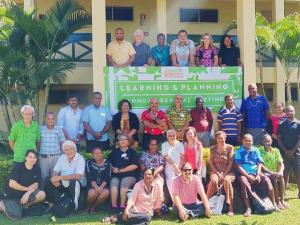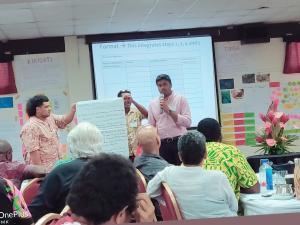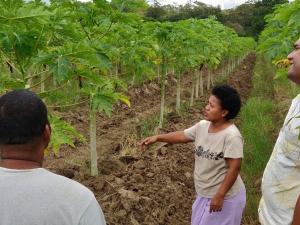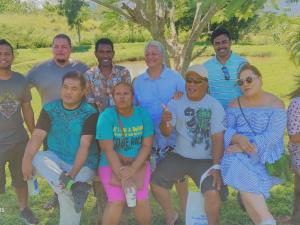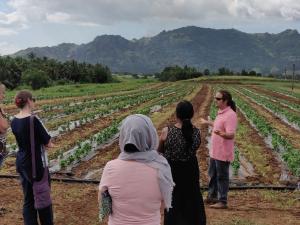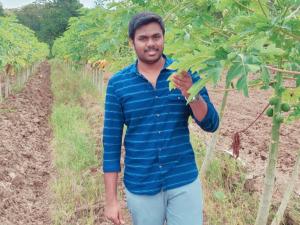Understanding and mitigating risks in pacific agribusinesses – student internship experience
Centre for Global Food and Resources (CGFAR) Master of Global Food and Agricultural Business student, Manoj Meluru Kumar recently returned from Fiji after completing an internship with Australian Centre for International Agricultural Research (ACIAR). Manoj talks about his internship experience in the blog below.
I recently completed a research internship at Australian Centre for International Agricultural Research (ACIAR) on a project entitled Pacific Agribusiness Research in Development Initiative Phase 2 (PARDI 2).
This PARDI 2 research project focuses on Fiji, Tonga and Vanuatu and aims to identify and understand how agribusiness development opportunities can contribute to improved economic growth and livelihoods in the Pacific. The project is implemented by University of Sunshine Coast and undertaken in collaboration with the Centre for Global Food and Resources (CGFAR) at University of Adelaide, Australian and Pacific Islands R&D partners including The Pacific Island Farmers Organisation Network (PIFON) which is a regional organisation based out of Fiji.
My internship project was entitled “Understanding and mitigating risks in Pacific Agribusiness”. The aim of the project was to examine agribusiness risks in Pacific Island countries (Fiji, Vanuatu and Tonga) with an aim to develop a risk minimization and mitigation framework with appropriate strategies to address identified risks. I believe risk mitigation plays a crucial role in long term sustainability of agrifood value chains. Agribusinesses in Pacific islands face multitudes of risks like natural disasters, lack of access to credit, inputs and access to modern market channels. Therefore, a key objective of my internship was the incorporation of an adapted risk assessment framework into selected agribusiness entities.
During my month long stay in Fiji, I was able to meet with local farmers and worked closely with them in their fields to gain practical working knowledge of agribusiness risks they had been facing. I also had the opportunity to share some techniques of papaya production with local farmers from my own past experience of working in papaya production in India. Furthermore, I actively participated in the workshops, seminars and training events to develop connections with regional and International organizations, stakeholders and scientists.
I had the opportunity to participat in the CTA/PIFON-OPPO: “Optimising the Performance of Producer Organisations” workshop held at Nadi, Fiji. The central question of the workshop was: How can we optimise the performance of producers' organisations for better income & nutrition? The team mapped 7 value chains and worked on farmer-inclusive business models and training modules that will support regional and national capacity development. The workshop helped improve my knowledge on value chain risks for Pacific agribusinesses.
Agritourism (Farm Tours) was one of the best experiences I had during my visit to Fiji. It is a fairly new concept in Fiji, Vanuatu and Tonga – therefore there is lack of adequate infrastructure and information. Experiences are often grouped with nature and eco tours, involving visits to farms and interaction with farmers. However, agritourism has the potential to offer diversification opportunities for farmers and grow their revenue.
During my Internship I was able to develop many new skills and it opened new career pathways. The internship experience has helped me better understand agribusiness particularly from a point of view of smallholder farmers and risks they face. This experience complements my studies in Global Food and Agricultural Business at CGFAR, University of Adelaide. The knowledge I have gained from my Master’s degree has helped me to produce efficient outputs during my internship. This Internship has given me more knowledge, work experience, information, confidence and connection within a broader network which are very important for my future career development.
I am grateful to ACIAR and CGFAR for giving me this wonderful opportunity. I would also like to thank PIFON for being delightful hosts during my one month stay in Fiji and making me feel at home. Their support has been very valuable to the internship. Finally, my sincere thanks to the project leader Dr Lex Thomson of University of Sunshine Coast and my Internship supervisors Mr. Craig Johns of CGFAR and Mr. Kyle Stice, PIFON for their support, advice and guidance.

